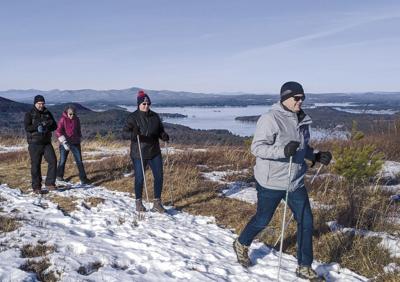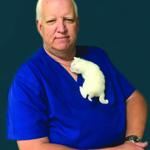GILFORD — Dealing with traumatic stress is like putting every bad experience into a backpack, according to Chris Bassett, a 23-year member of the Moultonborough Fire Department. The backpack gets heavier as each year goes by. Finally, it can be too much to bear.
That is how Bassett explains his two suicide attempts. It is not because he wanted to die; it is because death seemed to be the only way to get rid of the pain.
Ryan Shafer, a fire dispatcher from Keene who previously served as a police sergeant in Lawrence, Massachusetts, has lived with post-traumatic stress disorder for two decades. For him, it was a single tragic event that he cannot forget which is the cause of his distress.
He was called to investigate the death of a 17-year-old girl who was struck by a train. Authorities were never able to determine whether she slipped or was pushed onto the track, but seeing the aftermath of the event stayed with him. When a second girl was struck by a train two years later, it hit home again.
“It was almost 20 years ago, but I can still see them like it’s today,” Shafer said.
The two men were among seven first responders attending a Camp Resilience “Armor Up” retreat at the Gunstock Inn on Jan. 29-31. It was the second retreat specifically aimed at first responders offered by the Patriot Resilient Leader Institute, a nonprofit organization established in 2014 to help veterans and others who serve.
“From the beginning, we wanted to serve first responders as well as veterans,” said Kurt Webber, president of the institute. “We talked with police chiefs and fire chiefs who said the stigma surrounding these issues would make it difficult for people to ask to get help without adversely affecting their careers.”
As a result, the institute dropped first responders and focused on veterans — both active and retired military — for its retreats promoting physical, mental, and emotional wellbeing.
Last fall, the atmosphere surrounding mental health issues among first responders had changed enough — through groups such as the Granite State Critical Incident Stress Management Team, which offers counseling for those experiencing problems — that Camp Resilience scheduled its first retreat geared specifically to that demographic.
Shafer was among those attending that first retreat last October, and he returned for the second one in January.
“I found out about VFR [Veteran & First Responder Healthcare, which facilitates some of the Camp Resilience workshops] during a dispatchers’ conference,” he said.
VFR provides free assessments and establishes a personal treatment plan. Shafer participated in its Structured Intensive Outpatient Program for 7-8 months, he said, adding that it was very helpful in dealing with his problems.
Retreats
The January retreat included travel to the EVO Rock Indoor Climbing Wall and hiking on Pine Mountain, as well as yoga at the inn. There were also were workshops on Avoiding Burnout and Compassion Fatigue, Physical and Emotional Wellness, Stress Management and Self-Care, Behavioral Health Awareness, and Putting Self-Care into Practice.
Camp Resilience: New Gilford-based program offers respite & counseling services for veterans in need
Webber said the outdoor component is an integral part of the program. Depending upon the season, there may be hiking, kayaking, sailing, a ropes course, snowshoeing, and downhill or cross-country skiing.
“The Aerial Treetop at Gunstock is great,” Webber said. “We don’t twist their arms, but do encourage them to do as much as you want.” The result, he said, is having people tell him, “I found I could do more than I thought I could.”
The goal is to get people into the healing atmosphere provided by the outdoors, he said.
Participants also learn about therapeutic healing, hear from licensed clinical therapists, have mindfulness training, and one workshop even touches on financial management.
“Our retreats typically include all of these,” Webber said.
There also are retreats for caregivers, giving them a respite from their ongoing duties.
The Patriot Resilient Leader Institute covers all of the costs for participants except for their travel to get there, and it also covers the costs for the workshop leaders to attend. Those expenses include lodging at the Gunstock Inn, as well as breakfast, lunch, and dinner in Schuster’s Tavern. There are both weekend and mid-week retreats to accommodate participants’ work schedules.
Once the workshop ends, participants can keep in touch with each other through a private Facebook group.
“Staying in touch is an important part of it,” Webber said. “It keeps the group intact after they leave.”
Personal stories
Candice Alizio, the executive clinical director of VFR who led January’s Stress Management workshop with Sue Brown — a clinician and facilitator with VFR — said VFR’s program for veterans and first responders opened its Manchester office on Nov. 17. It is a Community Care partner with direct referrals from the Veterans Administration, with a primary focus on mental health and substance misuse.
“We get into the nitty-gritty of their experiences with those who understand,” Alizio said, noting that VFR is veteran-owned and -staffed. “I’m the token civilian,” she told workshop participants, but explained that she has six years’ experience in emergency services. “I saw them go through quite a bit — although not as much as you guys,” she said.
VFR’s larger mission is to support prevention as well as working on a culture shift so people are willing to seek the help they need.
“We’d like to reach people five years before they’re really struggling, so they don’t get there,” she said.
For those already experiencing problems, these workshops and retreats allow them to tell their stories. “It’s group-focused, because that’s where you get your support,” Alizio said.
The retreat also encourages people to try yoga and meditation: “The more awareness you have, the more you’ll pick up on it in others when you see it.”
Participants spoke of the ways their work and daily lives intersect, and it is not just those who go out on calls who are affected. Dispatchers, who hear the anxiety in callers’ voices and sometimes hear the distress of those in the background, spoke of how they become hyper-vigilant when out in public with their families.
One woman said she doesn’t want anyone interacting with her daughters because she has learned through the call traffic that there are sex offenders “on every corner.”
Some first responders limit their social interactions outside of work, and may even shut themselves in their homes between shifts. Others may take the long way home or stop by a lake to de-stress before returning home to their families.
One participant told of her reaction when seeing someone dozing in the grass beside the road. Her immediate thought was that it was someone who had overdosed. It turned out to be a man taking a break to relax.
Inappropriate responses
In the past, before authorities recognized the impact of stress, their adherence to protocols sometimes made it worse. Ryan Shafer said that, after he and other officers dealt with the 17-year-old’s death on the train tracks, their supervisor chastised one of them for wearing a knit hat to the scene.
“He never asked us how we were doing,” Shafer said, adding, “A supervisor shouldn’t ask if you need a break, but should demand it. You don’t take him up on it because you don’t want to appear weak in front of your colleagues.”
Until recently, he said, “They would drum you out if you sought psychological help. They thought of it as a weakness.”
Other participants voiced the opinion that group meetings conducted by some departments after a traumatic case are not helpful. They said people will not discuss their true feelings before a crowd, but will open up in a private setting.
“Take them individually, and say, ‘Tell me what you saw and experienced,’” Alizio advised. “The more we cope with and address the issues, the more mentally and physically resilient we become. We used to think the opposite.”
She said attitudes are changing as a younger generation of first responders move through the ranks. They are willing to talk, and “the ability to get vulnerable is important.”
Effective strategies
The workshop stressed that “focusing on the moment” is important to decompress after a difficult day. She discussed mindfulness exercises such as focusing on breathing, which can be the quickest way to slow the mind from the thoughts swirling around.
Focusing on what is happening with thoughts, breathing, muscles, and heartbeat can help people deal with “the actual” and avoid making problems bigger than they are, Alizio said. “If you recognize something bad, change it to something positive and the system starts to relax,” she said.
It also helps to focus on pets, imagine standing on top of a mountain or relaxing by the sea — anything that a person finds calming.
In addition to mindfulness exercises, physical activity also helps get rid of anxiety, she said.
“Do the things you enjoy more consistently” was her advice.
Ryan Shafer said that his experiences with Camp Resilience and VFR gave him tools to deal with stress.
“As a dispatcher, there’s trauma on both sides of the microphone,” Shafer said. “I tried regular counseling, but they were not acclimated to what we see on a daily basis. That’s the biggest thing: They have to know what you’ve gone through.
“You also need the peer-to-peer support groups. Attending every week, I’ve been able to be proud of the things I’ve done in the past. I used to shut the door on that, and threw away a lot of my awards. It’s almost like they gave a big part of my life back to me.”
He summed up by saying, “Whenever the public needs help, they call 911, but where do we go? This is our 911."


















(0) comments
Welcome to the discussion.
Log In
Keep it Clean. Please avoid obscene, vulgar, lewd, racist or sexually-oriented language.
PLEASE TURN OFF YOUR CAPS LOCK.
Don't Threaten. Threats of harming another person will not be tolerated.
Be Truthful. Don't knowingly lie about anyone or anything.
Be Nice. No racism, sexism or any sort of -ism that is degrading to another person.
Be Proactive. Use the 'Report' link on each comment to let us know of abusive posts.
Share with Us. We'd love to hear eyewitness accounts, the history behind an article.